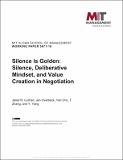Silence is golden: Extended silence, deliberative mindset, and value creation in negotiation.
Author(s)
Curhan, Jared R; Overbeck, Jennifer R; Cho, Yeri; Zhang, Teng; Yang, Yu
DownloadAccepted version (885.6Kb)
Open Access Policy
Open Access Policy
Creative Commons Attribution-Noncommercial-Share Alike
Terms of use
Metadata
Show full item recordAbstract
We examine the previously unstudied effects of silent pauses in bilateral negotiations. Two theoretical perspectives are tested-(a) an internal reflection perspective, whereby silence leads to a deliberative mindset, which, in turn, prompts value creation, and (b) a social perception perspective, whereby silence leads to intimidation and value claiming. Study 1 reveals a direct correlation between naturally occurring silent pauses lasting at least 3 s (extended silence) and value creation behaviors and outcomes. Study 2 shows that instructing one or both parties to use extended silence leads to value creation. Additional studies establish a mechanism for this effect, whereby negotiators who use extended silence show evidence of greater deliberative mindset (Study 3) and a reduction in fixed-pie perceptions (Study 4), both of which are associated with value creation. Taken together, our findings are consistent with the internal reflection perspective, whereby extended silence increases value creation by interrupting default, fixed-pie thinking, and fostering a more deliberative mindset. Findings of Study 3 also suggest a boundary condition whereby when status differences are salient, the use of silence by higher status parties leads to value creation, whereas the use of silence by lower status parties does not. Finally, Study 4 shows that instructing negotiators to use silence is more effective for value creation than instructing them to problem-solve. Challenging the social perception perspective that silence is a form of intimidation, we find no evidence for any associations between extended silence and the proportion of value claimed or subjective value of the counterpart. (PsycInfo Database Record (c) 2022 APA, all rights reserved).
Date issued
2022Department
Sloan School of ManagementJournal
Journal of Applied Psychology
Publisher
American Psychological Association (APA)
Citation
Curhan, Jared R, Overbeck, Jennifer R, Cho, Yeri, Zhang, Teng and Yang, Yu. 2022. "Silence is golden: Extended silence, deliberative mindset, and value creation in negotiation.." Journal of Applied Psychology, 107 (1).
Version: Author's final manuscript